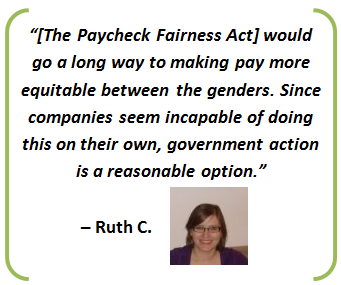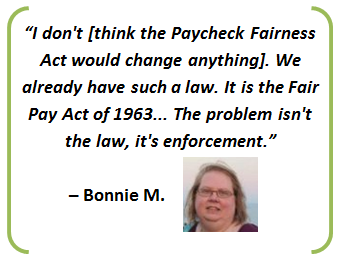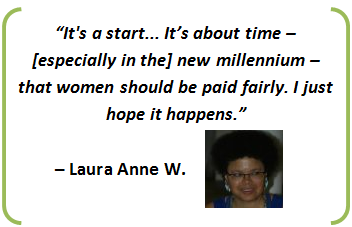The Paycheck Fairness Act’s Impact on Small Business
This Equal Pay Day, CW Highlights explores how the passage of the Paycheck Fairness Act would affect small businesses and their employees.
Since the Paycheck Fairness Act’s proposal in 2007, it has been the karma chameleon of bills – it comes and goes, it comes and goes. A quick search on Google Trends highlights the comings and goings of this bill’s tortured existence – searches for the bill spiked when it failed to pass in both 2010 and 2012, with deep valleys between those years, signifying relatively low public interest. President Obama’s mention of the bill during January’s State of the Union Address rekindled only tepid public interest, but it was enough to bolster support for reviving the bill in Congress. At the end of March, the Senate approved an amendment that would set aside funds for the Paycheck Fairness Act, essentially clearing space in the budget for the future passage of the amendment. This nudge toward passage may seem diminutive, but it could very well set the Paycheck Fairness Act on the path to President Obama’s desk, which could mean big changes for employees and small business owners alike.
Existing equal pay laws – a little too open to interpretation
The main goal of the Paycheck Fairness Act is to address the pay disparity between men and women. The actual size of the gender pay gap is often in dispute, but 2012 studies estimate that women on average make 77 percent of what men make. Lawmakers intended to address this issue with the Equal Pay Act of 1963, but a loophole in the law’s language quickly made enforcing the law consistently a near impossibility. Under the Equal Pay Act, “any factor other than sex” can be used to justify wage differences between men and women. This exception seems reasonable, but its wide scope has yielded wildly different interpretations of the law and consistently undermines the act’s intent. Even Supreme Court rulings, which set precedents lower courts are meant follow, have been ignored.

The Paycheck Fairness Act would further the efforts to close the pay gap between women and men by closing the loophole in the Equal Pay Act. The law narrowly tailors the “any factor other than sex” exemption to include only justifiable job-related reasons, such as “education, training or experience, and [reasons] consistent with business needs.” Closing the loophole would theoretically be a huge step toward closing the pay gap between men and women; whether we’ll get the chance to test that remains to be seen.
We can talk about our pay… right?
A great deal of confusion surrounds the Paycheck Fairness Act, and whether or not employees can legally discuss their pay seems to be the most confusing aspect of the law. After all, how can you spot pay discrimination if you can’t talk about your pay? Perusing Internet forums discussing the act showcases the confusion: LinkedIn member Jan V. said she didn’t believe the Paycheck Fairness Act would correct gender pay discrimination because, “…in most cases companies keep salaries close to the vest and it is extremely difficult to find out who is making what.” On the other hand, Ruth C. says, “… we need to start talking to our peers about pay. It is awkward, but it’s the only way to truly know what the differences are… The worst that can happen is [that] you don’t get the increase and you are in the same place you started.” Another (who wished to remain anonymous) said that she feared being fired or sued by her employer if she discussed pay with coworkers.

Passing the Paycheck Fairness act would change this by prohibiting employers from retaliating against employees who share salary information with coworkers. This facet of the act would not only protect employees, but it would also reinforce the Equal Pay, Fair Pay, and National Labor Relations Acts.
Small Business Owners and the Paycheck Fairness Act
The Senate’s decision to set aside funds for the Paycheck Fairness Act wasn’t just a victory for pay equality – it was also a victory for small business. Small businesses often do not possess the deep pockets larger businesses do, potentially making upholding the Paycheck Fairness Act a big challenge for small businesses with significant pay disparities between male and female comparators. Bear in mind that this would not apply to small businesses already exempt from the Fair Labor Standards Act, such as those who employ seasonal employees, contract workers, and employees who work for tips. Statistically speaking, the small businesses most likely to suffer the wrath of the Paycheck Fairness Act if passes are insurance companies and retail stores; those industries have the most instances of significant pay disparities between male and female comparators. Even then, retail tops the list largely due to Wal-Mart, the largest private employer in the United States whose female employees famously brought a class action suit against the behemoth for sex discrimination.
Fortunately, small businesses affected by the Paycheck Fairness Act would have resources available to them. Under the Small Business Assistance clause of the Paycheck Fairness Act, the Secretary of Labor and the Commissioner of the Equal Employment Opportunity Commission would work together to develop and provide “technical assistance material to assist small businesses in complying” with the Paycheck Fairness Act. What “technical assistance material” entails exactly is a bit hazy at this point, but March’s funding approval guarantees federal assistance for small businesses.
The Paycheck Fairness Act would help women help themselves
For those concerned that employers would be solely responsible for establishing pay equality among their male and female workers, fret not: the Paycheck Fairness Act would also establish programs to teach women and girls negotiation skills. Women are half as likely to negotiate their salaries, and while reasons for that vary from person to person, the fact remains that not negotiating makes employees vulnerable to pay disparities. Women in Western culture are often socialized to be conflict-averse and, as Dr. Loescher points out, negotiation often feels like conflict to those not practiced in negotiating, thus ensnaring some women in the trap of lower pay. By addressing both employer and employee, the Paycheck Fairness Act’s two-pronged approach to minimizing the pay disparity between genders sets it apart from existing equal pay laws, and indeed could make it the most effective law of its kind.

